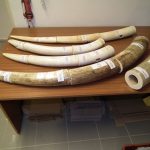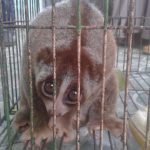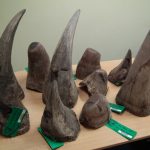Stolen Wilderness: a unique campaign on wildlife trafficking launched!
 Nature and Biodiversity
Nature and Biodiversity
Zoo Ostrava and the Kukang Rescue Program are launching “Stolen Wilderness”, a new information campaign which focuses on the issue of wildlife trafficking. This is the first comprehensive campaign in the Czech Republic to raise awareness of the overlooked facts of wildlife trafficking in the Czech Republic and in Europe. The campaign has been officially sponsored by the Ministry of the Environment of the Czech Republic.
What is “Stolen Wilderness”? It is the first comprehensive awareness-raising campaign aimed at wildlife trafficking in the Czech Republic and Europe. In addition to drug, arms and human trafficking, wildlife trafficking is one of the most lucrative illegal businesses in the world. It is often linked to other types of organized crime – for example, ivory is sold to finance many terrorist groups. At the same time, it is one of the greatest threats to world biodiversity, i.e. species diversity, as many wild species of animals and plants are on the verge of extinction due to increasing demand and poaching.
- U
Animal trafficking may seem to be a problem only for African or Asian countries, but in reality, many Europeans, including many Czech citizens, are involved in it. Seizing animals or parts of their bodies in the territory of the Czech Republic is nothing special, despite the immense ingenuity of smugglers.
“It’s like fighting a hydra. You chop off one head and another will grow in its place. Sometimes one can’t help but feel absolutely helpless and angry, but we have to fight it, we cannot afford to fail”, says Pavla Říhová, the head of the Czech Environmental Inspectorate’s Department of International Biodiversity Protection and CITES.
The main tool of the new campaign is the educational website www.ukradenadivocina.org. It focuses on the comprehensive issues of trafficking – it shows the most frequently trafficked species, and presents the main reasons for this trade, such as traditional Chinese medicine, trade in pets, souvenirs, etc.
To educate the general public, Zoo Ostrava has opened the “Stolen Wilderness Path”. The path consists of information panels located on several thematically related places in the Zoo. Each panel is made up of photographs describing one of the many problems involved in animal trafficking, including information on the estimated extent of the problem. It is interesting that all the animals or their parts in the photographs, such as ivory, rhinoceros horns, feline furs, anteater scales etc., were confiscated by the control authorities in the Czech Republic. These panels are also available in electronic form.
“Stolen Wilderness” was created thanks to the rich experience of Pavla Říhová, the head of the Czech Environmental Inspectorate’s Department of International Biodiversity Protection and CITES, in cooperation with Petr Čolas, Director of Zoo Ostrava, František Příbrský, Zoo Ostrava’s field zoologist and the head of Kukang Rescue Program, Lucie Čižmářová, Zoo Olomouc’s field zoologist and photographer, and other team members.
The Ministry of the Environment, headed by Richard Brabec, 1st Deputy Prime Minister of the Czech Republic, decided to become the campaign’s sponsor.
“I believe cooperation of the Ministry of the Environment, Zoo Ostrava and the Kukang Rescue Program on such an important issue as animal trafficking is another milestone in the historical development of Czech zoos”, says Petr Čolas, Director of Zoo Ostrava. Moreover, this cooperation fulfils one of the objectives of the EU Action Plan against Wildlife Trafficking.
Photos: archive of the CEI and The Kukang Rescue Program.





